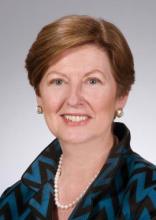User login
The patient-centered medical home model has caused big changes in primary care practices and given physicians the opportunity to earn a bit more money for care coordination. Now the same forces are at work on the specialty side of medicine.
One year after the National Committee for Quality Assurance (NCQA) launched its "Patient-Centered Specialty Practice Recognition" program, 23 practices and 287 clinicians have achieved the 3-year recognition.
"Coordination is a two-way street," Margaret O’Kane, NCQA president, said during a webinar to highlight lessons learned during the first year of the program. "You can’t just do this on the primary care side."
Dr. Andrew Chapman, director of regional cancer care at Jefferson Medical Oncology Associates in Philadelphia, said receiving NCQA recognition through the new specialty-focused program was the first step toward achieving a "shared model of care" with the primary care physicians in his community.
In the past, the model in oncology was that once a cancer diagnosis was made, all of the care would be assumed by the oncologist. But that model is no longer viable, Dr. Chapman said, and integrating specialists into the medical home can improve quality and safety.
"What we do now has become so complex that taking care of many of the issues that an internist or a family medicine physician is really expert at, is really out of our realm," he said.
The NCQA recognition program is based on the concept of the medical home "neighbor" that was developed by the American College of Physicians and follows the same model as the NCQA’s patient-centered medical home recognition program for primary care physicians.
To qualify, practices must meet several standards for care coordination and information sharing, including tracking and coordinating referrals, providing extended hours and electronic access to the practice, tracking patients as they visit the hospital and emergency department, and providing previsit planning and medication management.
Specialty practices must also measure their efforts on clinical quality, utilization, care coordination, and patient satisfaction.
The model is a good fit for obstetrics and gynecology practices, according to Kristin Bell, the practice manager for Women’s Healthcare Associates in Portland, Ore.
In pursuing NCQA recognition, the practice made a number of changes aimed at improving coordination. To start, they trained a staff member as a referral navigator and tasked her with streamlining the process of gathering records, scheduling patient appointments, and ensuring that records were returned to the referring physician.
"Rather than have the whole team in the front office attempt to manage little pieces of that process, we made one person ... primarily responsible for that full process," Ms. Bell said.
They also began integrating behavioral health services into the practice, bringing a licensed clinical social worker on site. Patients are more likely to keep their appointments with the social worker now that they can do it at the ob.gyn.’s office, Ms. Bell said, and it gives patients more support in making lifestyle changes to support their health.
"It really has helped to remove barriers for patients," she said.
While physicians are embracing the medical neighborhood model, payers are moving more slowly.
Patricia Barrett, NCQA’s vice president for product development, said a few payers have indicated they that would offer bonus payments to specialty practices that achieve the NCQA recognition. But there’s not the same level of enthusiasm for paying specialists more as there was in rewarding primary care practices that become medical homes, she said.
The financial incentives for specialty practices are more likely to come through opportunities to participate in accountable care organizations or shared savings models, said Dr. Debra Karnasiewicz, director of quality and health information for Medical Associates of the Hudson Valley, a small, multispecialty practice in Kingston, N.Y. Her practice has been working with other small practices in their area, as well as payers, to develop a shared savings model similar to what is underway through the Centers for Medicare & Medicaid Services.
On Twitter @maryellenny
The patient-centered medical home model has caused big changes in primary care practices and given physicians the opportunity to earn a bit more money for care coordination. Now the same forces are at work on the specialty side of medicine.
One year after the National Committee for Quality Assurance (NCQA) launched its "Patient-Centered Specialty Practice Recognition" program, 23 practices and 287 clinicians have achieved the 3-year recognition.
"Coordination is a two-way street," Margaret O’Kane, NCQA president, said during a webinar to highlight lessons learned during the first year of the program. "You can’t just do this on the primary care side."
Dr. Andrew Chapman, director of regional cancer care at Jefferson Medical Oncology Associates in Philadelphia, said receiving NCQA recognition through the new specialty-focused program was the first step toward achieving a "shared model of care" with the primary care physicians in his community.
In the past, the model in oncology was that once a cancer diagnosis was made, all of the care would be assumed by the oncologist. But that model is no longer viable, Dr. Chapman said, and integrating specialists into the medical home can improve quality and safety.
"What we do now has become so complex that taking care of many of the issues that an internist or a family medicine physician is really expert at, is really out of our realm," he said.
The NCQA recognition program is based on the concept of the medical home "neighbor" that was developed by the American College of Physicians and follows the same model as the NCQA’s patient-centered medical home recognition program for primary care physicians.
To qualify, practices must meet several standards for care coordination and information sharing, including tracking and coordinating referrals, providing extended hours and electronic access to the practice, tracking patients as they visit the hospital and emergency department, and providing previsit planning and medication management.
Specialty practices must also measure their efforts on clinical quality, utilization, care coordination, and patient satisfaction.
The model is a good fit for obstetrics and gynecology practices, according to Kristin Bell, the practice manager for Women’s Healthcare Associates in Portland, Ore.
In pursuing NCQA recognition, the practice made a number of changes aimed at improving coordination. To start, they trained a staff member as a referral navigator and tasked her with streamlining the process of gathering records, scheduling patient appointments, and ensuring that records were returned to the referring physician.
"Rather than have the whole team in the front office attempt to manage little pieces of that process, we made one person ... primarily responsible for that full process," Ms. Bell said.
They also began integrating behavioral health services into the practice, bringing a licensed clinical social worker on site. Patients are more likely to keep their appointments with the social worker now that they can do it at the ob.gyn.’s office, Ms. Bell said, and it gives patients more support in making lifestyle changes to support their health.
"It really has helped to remove barriers for patients," she said.
While physicians are embracing the medical neighborhood model, payers are moving more slowly.
Patricia Barrett, NCQA’s vice president for product development, said a few payers have indicated they that would offer bonus payments to specialty practices that achieve the NCQA recognition. But there’s not the same level of enthusiasm for paying specialists more as there was in rewarding primary care practices that become medical homes, she said.
The financial incentives for specialty practices are more likely to come through opportunities to participate in accountable care organizations or shared savings models, said Dr. Debra Karnasiewicz, director of quality and health information for Medical Associates of the Hudson Valley, a small, multispecialty practice in Kingston, N.Y. Her practice has been working with other small practices in their area, as well as payers, to develop a shared savings model similar to what is underway through the Centers for Medicare & Medicaid Services.
On Twitter @maryellenny
The patient-centered medical home model has caused big changes in primary care practices and given physicians the opportunity to earn a bit more money for care coordination. Now the same forces are at work on the specialty side of medicine.
One year after the National Committee for Quality Assurance (NCQA) launched its "Patient-Centered Specialty Practice Recognition" program, 23 practices and 287 clinicians have achieved the 3-year recognition.
"Coordination is a two-way street," Margaret O’Kane, NCQA president, said during a webinar to highlight lessons learned during the first year of the program. "You can’t just do this on the primary care side."
Dr. Andrew Chapman, director of regional cancer care at Jefferson Medical Oncology Associates in Philadelphia, said receiving NCQA recognition through the new specialty-focused program was the first step toward achieving a "shared model of care" with the primary care physicians in his community.
In the past, the model in oncology was that once a cancer diagnosis was made, all of the care would be assumed by the oncologist. But that model is no longer viable, Dr. Chapman said, and integrating specialists into the medical home can improve quality and safety.
"What we do now has become so complex that taking care of many of the issues that an internist or a family medicine physician is really expert at, is really out of our realm," he said.
The NCQA recognition program is based on the concept of the medical home "neighbor" that was developed by the American College of Physicians and follows the same model as the NCQA’s patient-centered medical home recognition program for primary care physicians.
To qualify, practices must meet several standards for care coordination and information sharing, including tracking and coordinating referrals, providing extended hours and electronic access to the practice, tracking patients as they visit the hospital and emergency department, and providing previsit planning and medication management.
Specialty practices must also measure their efforts on clinical quality, utilization, care coordination, and patient satisfaction.
The model is a good fit for obstetrics and gynecology practices, according to Kristin Bell, the practice manager for Women’s Healthcare Associates in Portland, Ore.
In pursuing NCQA recognition, the practice made a number of changes aimed at improving coordination. To start, they trained a staff member as a referral navigator and tasked her with streamlining the process of gathering records, scheduling patient appointments, and ensuring that records were returned to the referring physician.
"Rather than have the whole team in the front office attempt to manage little pieces of that process, we made one person ... primarily responsible for that full process," Ms. Bell said.
They also began integrating behavioral health services into the practice, bringing a licensed clinical social worker on site. Patients are more likely to keep their appointments with the social worker now that they can do it at the ob.gyn.’s office, Ms. Bell said, and it gives patients more support in making lifestyle changes to support their health.
"It really has helped to remove barriers for patients," she said.
While physicians are embracing the medical neighborhood model, payers are moving more slowly.
Patricia Barrett, NCQA’s vice president for product development, said a few payers have indicated they that would offer bonus payments to specialty practices that achieve the NCQA recognition. But there’s not the same level of enthusiasm for paying specialists more as there was in rewarding primary care practices that become medical homes, she said.
The financial incentives for specialty practices are more likely to come through opportunities to participate in accountable care organizations or shared savings models, said Dr. Debra Karnasiewicz, director of quality and health information for Medical Associates of the Hudson Valley, a small, multispecialty practice in Kingston, N.Y. Her practice has been working with other small practices in their area, as well as payers, to develop a shared savings model similar to what is underway through the Centers for Medicare & Medicaid Services.
On Twitter @maryellenny


